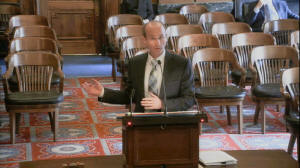|
The Fourth Circuit Court of Appeals reversed a trial court’s
order denying Miller’s claim for compensation, and questioned
whether the Grain Code’s language sets a pricing date as a
matter of law when the parties do not enter a price-later
contract within 30 days of grain delivery.
That claim by Robert Miller was originally denied, but his
attorney, Timothy Cantlin, said Illinois’ Grain Code is there
for a reason.
“To protect producers in the event that there is a failure, and
to that end, this code should be liberally construed and
liberally administered in favor of the claimant,” Cantlin said.
Attorney Anna Gottlieb, who represents the Illinois Department
of Agriculture, said Miller doesn’t qualify for reimbursement.
“The farmer may seek recovery from this limited fund and he will
recover if he can meet the requirements under the Grain Code,”
Gottlieb said. “Here, Mr. Miller cannot show that he has met
those requirements because the grain at issue was priced outside
the recovery window.”
According to farmdoc daily, the department has argued that “if
the parties fail to enter into a contract within 30 days of the
last delivery, the grain ‘shall be priced on the next business
day’” and that the “statute does not indicate who prices the
grain, and, therefore, the plain meaning of the provision is
that the grain is priced automatically on the thirtieth day.”
In contrast, Miller argued that nothing in the language of
Section 10-15(e) required automatic pricing. The Fourth Circuit
agreed with Miller, noting that the statute’s plain language
“dictates an individual or entity shall set a price on or find
out the price of the grain” and that entity is the grain dealer.

|
|




